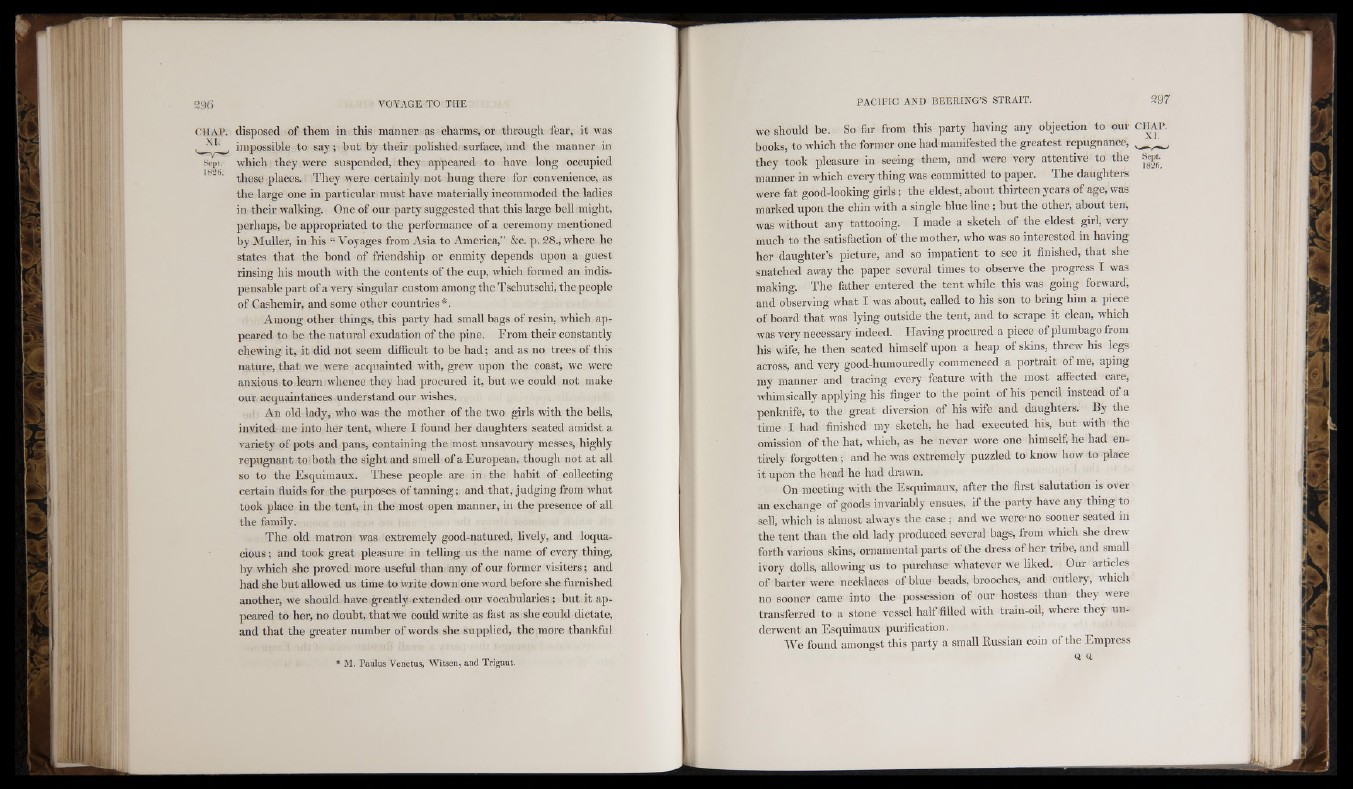
C H A P ,
X I .
So|,t.
1S26.
disposed of them in this manner as charms, or through fear, it was
impossible to say; but by their polished surface, and the manner in
which they were suspended, they appeared to have long occupied
these places. They were certainly not hung there for convenience, as
the large one in particular must have materially incommoded the ladies
in their walking. One of our party suggested that this large bell might,
perhaps, be appropriated to the performance of a ceremony mentioned
by Muller, in his “Voyages from Asia to America,” &c. p. 28., where he
states that the bond of friendship or enmity depends upon a guest
rinsing his mouth with the contents of the cup, which formed an indispensable
part of a very singular custom among the Tschutschi, the people
of Casherair, and some other countries*.
Among other things, this party had small bags of resin, which appeared
to be the natural exudation of the pine. From their constantly
chewing it, it did not seem difficult to be had; and as no trees of this
nature, that we were acquainted with, grew upon the coast, we were
anxious to learn whence they had procured it, but we could not make
our acquaintances understand our wishes.
An old lady, who was the mother of the two girls with the bells,
invited me into her tent, where I found her daughters seated amidst a
variety of pots and pans, containing the most unsavoury messes, highly
repugnant to both the sight and smell of a European, though not at all
so to the Esquimaux. These people are in the habit of collecting
certain fluids for the purposes of tanning; and that, judging from what
took place in the tent, in the most open manner, in the presence of all
the family.
The old matron was extremely good-natured, lively, and loquacious
; and took great pleasure in telling us the name of every thing,
by which she proved more useful than any of our former visiters; and
had she but allowed us time to write down one word before she furnished
another, we should have greatly extended our vocabularies ; but it appeared
to her, no doubt, that we could write as fast as she could dictate,
and that the greater number of words she supplied, the more thankful
» M . P au lu s Venetus, W its e n , an d T rig a u t.
we should be. So far from this party having any objection to our C H A P .
books, to which the former one had manifested the greatest repugnance,
they took pleasure in seeing them, and were very attentive to the Sept.
manner in which every thing was committed to paper. The daughters
were fat good-looking girls; the eldest, about thirteen years of age, was
marked upon the chin with a single blue lin e ; but the other, about ten,
was without any tattooing. I made a sketch of the eldest girl, very
much to the satisfaction of the mother, who was so interested in having
her daughter’s picture, and so impatient to see it finished, that she
snatched away the paper several times to observe the progress I was
making. The father entered the tent while this was going forward,
and observing what I was about, called to his son to bring him a piece
of board that was lying outside the tent, and to scrape it clean, which
was very necessary indeed. Having procured a piece of plumbago from
his wife, he then seated himself upon a heap of skins, threw his legs
across, and very good-humourcdly commenced a portrait of me, aping
my manner and tracing every feature with the most affected care,
whimsically applying his finger to the point of his pencil instead of a
penknife, to the great diversion of his wife and daughters. By the
time I had finished my sketch, he had executed his, but with the
omission of the hat, which, as he never wore one himself, he had entirely
forgotten; and he was extremely puzzled to know how to place
it upon the head he had drawn.
On meeting with the Esquimaux, after the first salutation is over
an exchange of goods invariably ensues, if the party have any thing to
sell, which is almost always the case; and we were- no sooner seated in
the tent than the old lady produced several bags, from which she drew
forth various skins, ornamental parts of the dress of her tribe, and small
ivory dolls, allowing us to purchase whatever we hked. Our articles
of barter were necklaces of blue beads, brooches, and cutlery, wluch
no sooner came into the possession of our hostess than they were
transferred to a stone vessel half filled with train-oil, where they underwent
an Esquimaux purification.
YY"e found amongst this party a small Russian coin of the Empress
Q Q
14